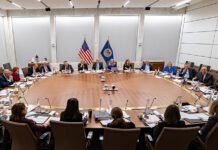 M.M.Khanna,
M.M.Khanna,
INVC,
Chandigarh,
Today Yuvsatta-an NGO and Gurukul Global School, Chandigarh organized a Seminar on ‘Indo China Relations in 21st Century’, at ICSSR Complex of Panjab University, Chandigarh. In his introductory address Prof. Manjit Singh of Panjab University who recently came back from an exchange visit from China said that nobody in the city as well as rural areas was found by them to be idle. Life was active in the streets till mid night and again people will be ready for the day by 7 AM. A new China is emerging in a massive way thanks to the massive construction work going on around all the cities. The centralized planning and total control over the financial institutions have yielded results within the last couple of decades that are perhaps unparallel in the history of mankind. There is a large working class and a small middle class and a tough competition in the job market. Pramod Sharma, Coordinator of Yuvsatta shared that nearly 20 years ago, bilateral trade of India and China by 2000 this had grown slightly to just about 3 billion US dollars. In a decade since then, this grown to 74 billion US dollars. To put this figure into perspective, the bilateral trade between India and China is four times Nepal’s entire GDP. And we are targeting bilateral trade of US$ 100 million by 2015. Today, China is India’s largest trading partner in the world and India is China’s seventh largest export destination. Prof. Sarwal of DAV College added that Chinese government has ensured basic necessities to every human being. The delegation did not come across any slum, beggar or ill-claded person. Women are more active in economic life than men. Due to small family norms the children get extra care from the parents. Even the aged persons are living an active life. Making a point Avtar Singh of Punjab Book Centre said that “We in India have to be more concerted, focused and above all take everybody along by making special efforts for inclusive growth. Without strengthening and enriching our human resources it is not possible for India to compete with the powerful ‘dragon’.” Aruna Bhardwaj, Principal of the Gurukul Global School, who had also recently gone to China as part of Yuvsatta’a exchange programme and is now introducing learning of Chinese language in her School shared that the Central Board of Secondary Education of India has signed an agreement with the Confucius Institute Headquarters to introduce Chinese as a foreign language for middle school students in CBSE schools in India starting with 500 schools and gradually extending to all 11,500 which is a good sign to bring the young people of both this giant civilizations much closer. Anu Chatrath, former Mayor of Chandigarh emphasized that history shows that the result of war and rivalry is always a larger disaster. In an interdependent current world, we have no choice but cooperate with each other in the win-win format. In his concluding remarks Ajay Shukla, Editor of Aaj Samaj said we Indians can learn a lot from China terms of conservation of our language, art, culture, dignity of women, patriotism, land reforms and infrastructure development. The peoples of both India and China are sagacious enough to overpower any challenge. As Gandhi said, “we need to be the change; we want to see in the world”. In the end participants of the Seminar were of the opinion that India plus China instead of India versus China is the only option for a stronger and peaceful Asia.















